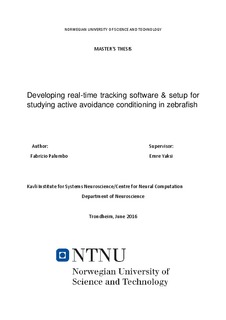Developing real-time tracking software and setup for studying active avoidance conditioning in zebrafish
Master thesis
Permanent lenke
http://hdl.handle.net/11250/2437136Utgivelsesdato
2016Metadata
Vis full innførselSamlinger
Sammendrag
The cognitive capabilities of fish have historically been underestimated and, in many respects, they are comparable to birds and mammals. Currently, an increasing number of behavioural neuroscience laboratories have started using zebrafish as their main animal model. Although the zebrafish brain is substantially more primitive than that of mammals, basic brain anatomy is highly conserved across vertebrates. Furthermore, fish have a sophisticated behavioural repertoire that can allow quantification of functional changes in the brain induced by environmental manipulations. Zebrafish have been mostly used so far in developmental biology, genetics, pharmacology and toxicology. Currently, researchers are extending their use in behavioural neuroscience, focusing in particular on early developmental stages (one to three weeks old). At this developmental stage, their small size and transparency allows single and multi-photon imaging in order to visualize the brain activity. However, investigation on associative conditioning in larvae/juvenile zebrafish is limited and the mechanism remains poorly understood. Historically, most of the behaviour studies relied on manual quantification of fish behaviour, which is sensitive to human errors. To achieve a reproducible and high throughput quantification of fish behaviour, fundamental in behavioural studies, a fully automated setup is required.
The aim of this master thesis is to develop hardware and software for a setup that allows monitoring and quantification of zebrafish behaviour during active avoidance conditioning assays. In order to establish this learning protocol, I first developed a microcontroller based hardware platform and later used the C++ language to implement multi-threaded software able to simultaneously track the position of six fish in real time. The real time tracking allowed me to administer an aversive stimulus to individual animals based on their position. The setup developed in this master thesis proposes a systematic and fully automated approach for the investigation of zebrafish behaviour.
Using this setup, I have tested the learning response of three groups of zebrafish, from one to three weeks old. My results indicate that zebrafish can perform active avoidance already at the one-week-old larval stage. The learning performance of animals improves across developmental stages, resulting in a faster and more stable acquisition of conditioned behaviour. Moreover, thanks to the high spatial and temporal resolution in the quantification of fish behaviour, I have investigated how parameters such as baseline swim pattern, average velocity and thigmotaxis correlate with the learning performance of the fish.
